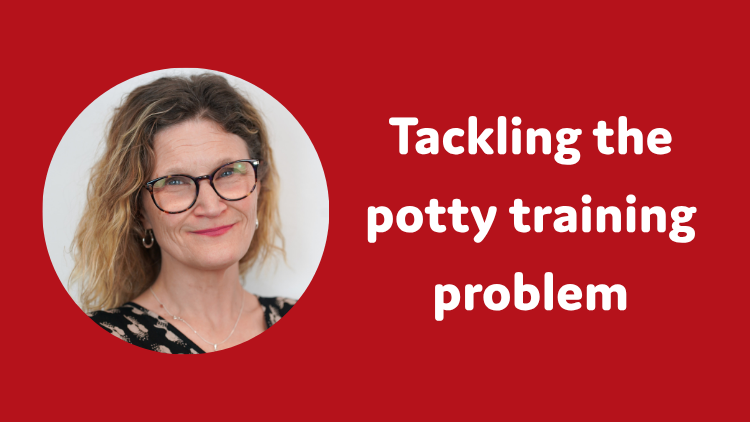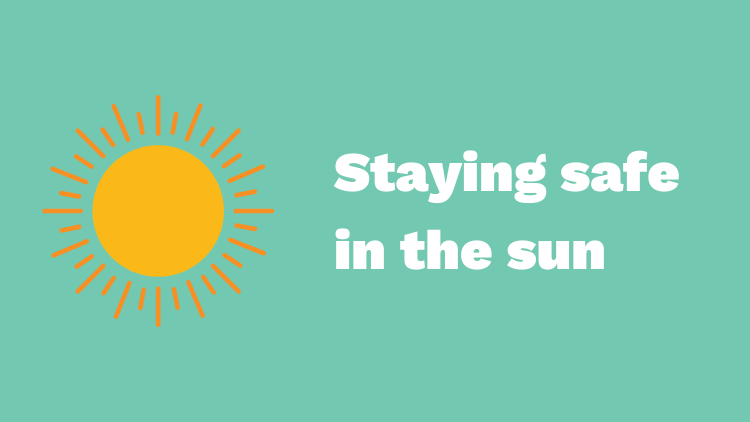Sarah Timms, Family Services lead at ERIC, The Children’s Bowel & Bladder Charity
Over the last two generations, the average age that children are being potty trained in the UK has risen. In the 1970s and 80s most children (83%) were out of nappies by 18 months. In 2004, the average age a child was potty trained in the UK was 2.5 years old(1). Just 20 years later, the average age of potty training has risen to 3.5 years of age.
Later potty training can have significant impacts on a child’s health and wellbeing, education, and health and social care. Research shows it is better for a child’s bladder and bowel health to stop using nappies between 18 and 30 months(2). But more children than ever are starting school and childcare settings not potty trained.
Currently 1.5 million (1 in 9) children in the UK live with a bowel or bladder condition (3), that is higher than the incidence of asthma (4). These are harder to spot and can become more pronounced when children are potty trained later. ERIC supports families in need – and demand is higher than ever. Better education is also needed for childcare professionals, to improve outcomes for children and all who are caring for them.
Why are children potty training later?
Possible reasons for later potty training include:
- Societal changes: more families in which both parents work. In 2023, around 72% of 0 – 4 year olds (around 2.2 million children) were in some form of childcare during the term-time week (5).
- Technology: disposable nappies keep children drier than ever – they often don’t feel it when wet, making toilet training harder.
- Poverty: an extra 100,000 children were living below the breadline in the year to April 2024 (6). Financial and emotional stressors for families can impact potty training, and result in less access to support.
- Service provision: cuts to health visitor numbers and a continued disparity in children’s continence service provision, resulting in families not having the support they need.
- ‘Readiness’ myth: a cultural shift towards waiting for ‘signs of readiness’, but many children, particularly those with additional needs, will never give signs that they’re ready to potty or toilet train.
Why potty train earlier?
Children toilet training a year earlier could reduce social and emotional impacts on the child, improve health, improve education, save money for the NHS and parents, and improve environmental outcomes:
- Two thirds of teachers (65%) and 58% of parents agree that not being ready for school when starting Reception could have long term impacts on a child’s success in later life (7). Toilet training could mean they’re less likely to feel embarrassed or be ostracized from their peers.
- Teachers could save up to 456 hours a year if they didn’t have to deal with children who weren’t toilet trained – that’s around 10 days of extra teaching time (8).
- There is a link between delayed toilet training and childhood constipation. Currently 1 in 3 children suffer from constipation (9). In a single year, the NHS spent £168 million treating constipation. The cost of treating constipation is equivalent to funding 7304 newly qualified nurses for a year (10).
- It’s estimated the average child uses between 4,000 and 6,000 disposable nappies. If every child was toilet trained one year earlier, we could save between 5.3bn – 7.1bn nappies from going to landfill (11).
- Parents in the UK will spend approximately £1000 on disposable nappies per child from birth to toilet training (12). By toilet training earlier, parents could save themselves up to £400 per year – equivalent to about 2 weeks of nursery fees in some parts of the country.
What’s being done?
In a survey of early years staff conducted by ERIC and the National Day Nurseries Association (NDNA), 70% of early years practitioners told us they have received no training in how to potty train (13).
ERIC has launched Let’s Go Potty, an online learning course for early years practitioners which uses the same, simple evidence-based approach to potty training that we advocate for families. This encourages consistency between settings, and helps staff feel more confident helping children and families with this important development milestone. Find out more here: Training for early years practitioners – ERIC
We want more settings to adopt this approach, but it’s not yet a mandatory part of training.
ERIC recently hosted a roundtable discussion in Parliament bringing together key stakeholders in early years, education and children’s health and social care, to discuss the huge impact delayed toilet training is having on children’s lives. The charity is calling for the government to issue clear guidance on toilet training with an unambiguous message that “children should be out of nappies by 18 – 30 months”.
In the meantime, we are continuing to collaborate with early years practitioners, education settings, healthcare professionals and government to improve the support available to families. Over the summer we are running our All Aboard the Toilet Train campaign, which offers free online information and support to parents/carers whose children are starting school in September and are not yet potty trained. Find out more at https://eric.org.uk/all-aboard-the-toilet-train-get-ready-for-school/
Coram PACEY resources
Coram PACEY held a Live webinar with ERIC, titled Supporting potty learning in early years settings. Watch the webinar and discover the role early years providers can play in empowering and supporting parents with the best advice so they can effectively potty train their child and avoid problems.
You can also read Coram PACEY’s Childcare Professional magazine feature on supporting autistic children with toilet training. Find it in our Summer 2025 edition of Childcare Professional (page 38-40).
How you can support ERIC
At ERIC, demand for our services has never been higher and we’re facing a shortfall in funding which could impact our services. Over the summer, we’re asking our supporters to take on a Big Summer Challenge for ERIC as we aim to raise £10,000 to support our work with children and families. The shame and stigma around bowel and bladder conditions means many people are suffering in silence. With our outreach work, we’re breaking down barriers and offering support to families who need us.
But to do that we need YOU. Whether you do a sponsored run, host a bake sale, or wear red, white and blue to work – do it for ERIC.
Visit https://eric.org.uk/fundraise-for-us/ to find out more.
Author Bio: Sarah Timms leads Family Services at ERIC, The Children’s Bowel & Bladder Charity, championing support for families navigating toilet training, constipation, and bladder issues. A certified Mental Health First Aider based in Bristol, she develops podcasts, helpline services, and supports community campaigns like All Aboard The Toilet Train, empowering parents with practical, compassionate care.

Sources:
- Bakker & Wyndaele (2000), available online: https://pubmed.ncbi.nlm.nih.gov/10930924/
- A prospective study of age at initiation of toilet training and subsequent daytime bladder control in school-age children, Carol Joinson 1, Jon Heron, Alexander Von Gontard, Ursula Butler, Alan Emond, Jean Golding, 2009: https://pubmed.ncbi.nlm.nih.gov/19827219/
- The Paediatric Continence Forum Children’s Continence Commissioning Guide, updated April 2024 ; NHS. Available online: https://drive.google.com/file/d/1PVroeMlwma4hrI6Uz_dTnGRWRQbdsZSh/view
- RCPCH State of Child Health, Asthma. Available online: https://stateofchildhealth.rcpch.ac.uk/evidence/long-term-conditions/asthma/
- UK Childcare and early years survey of parents, 2024. Available online: https://explore-education-statistics.service.gov.uk/find-statistics/childcare-and-early-years-survey-of-parents
- Households Below Average Income: an analysis of the UK income distribution: FYE 1995 to FYE 2024, Department for Work and Pensions. Available online: https://www.gov.uk/government/statistics/households-below-average-income-for-financial-years-ending-1995-to-2024/households-below-average-income-an-analysis-of-the-uk-income-distribution-fye-1995-to-fye-2024#children-in-low-income-households
- Kindred Squared School Readiness Survey 2024. Available online: https://kindredsquared.org.uk/school-readiness-survey/
- Kindred Squared School Readiness Survey 2024. Available online: https://kindredsquared.org.uk/school-readiness-survey/ Calculation: teachers spend an average of 2.4 hours each day helping children who are not toilet ready for school. In England and Wales, the school year consists of approximately 190 school days. 2.4 x 190 = 456. A typical school day is 6.5 hours long. 456 / 6.5 = 70 hours. 70 hours / 6.5 = 10.
- NHS Inform (2023) Constipation. Available online: https://www.nhsinform.scot/illnesses-and-conditions/stomach-liver-and-gastrointestinal-tract/constipation/
- £168 million was spent treating constipation in 2018/19. This includes avoidable admissions to A&E for constipation (£81 million) and prescription laxative costs (£87 million). The cost of treating constipation in 2018/19 is equivalent to funding 7304 newly-qualified nurses for a year: https://www.bbuk.org.uk/the-bowel-interest-group-reveals-new-data-on-the-cost-of-constipation/
- Source: WRAP https://www.wrap.ngo/resources/guide/waste-prevention-activities/real-nappies/overview
Calculation: the average child uses between 4,000 and 6,000 disposable nappies before they are potty trained. The average age a child is potty trained is 3 – 4. Assuming the highest usage (6,000), that equates to an annual usage of 1,500 – 2,000 nappies. The estimated population of children aged 0-3 in the UK in 2023, was just under 3.57 million. 1500 x 3.57 million = 5355000000 or 2000 x 3.57 million = 7140000000. - Source: The Guardian (Which?)
https://www.theguardian.com/money/2015/jul/04/nappies-which-best-disposables-reusables-cost-ethics#:~:text=The%20average%20baby%20gets%20through%204%2C000%20disposable,of%20half%20a%20tonne%20of%20carbon%20dioxide.&text=Total%20estimated%20cost%20for%20three%20children%20from,an%20average%20cost%20per%20child%20of%20%C2%A3575.56. - ERIC survey, 2019. Available online: https://eric.org.uk/news/more-children-toilet-training-later-how-early-years-can-help-parents/#:~:text=Drinks%20shouldn’t%20be%20limited,and%20emptied%20properly%20to%20work.%E2%80%9D&text=The%20survey%20revealed%20that%2070,health%20visiting%20teams%20(25%25).



